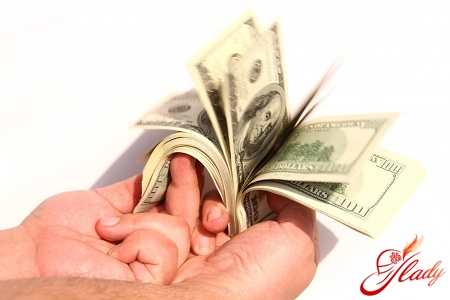 "Credit" - this word has recently become firmly establishedhas become a part of our everyday life. It constantly sounds from TV screens, we see it on advertising banners, we read it on leaflets from the mailbox. Almost every day we receive various and, at first glance, very tempting offers via e-mail and SMS messages. "Take today and pay tomorrow" - that's the main idea of lending. And, you must admit, it sounds very tempting. You don't have to deny yourself everything and painfully save up for the thing you like. All your dreams can come true today, right now. So is it worth taking out a loan? Maybe a loan is a simple and easy path to happiness?
"Credit" - this word has recently become firmly establishedhas become a part of our everyday life. It constantly sounds from TV screens, we see it on advertising banners, we read it on leaflets from the mailbox. Almost every day we receive various and, at first glance, very tempting offers via e-mail and SMS messages. "Take today and pay tomorrow" - that's the main idea of lending. And, you must admit, it sounds very tempting. You don't have to deny yourself everything and painfully save up for the thing you like. All your dreams can come true today, right now. So is it worth taking out a loan? Maybe a loan is a simple and easy path to happiness?
What is a loan?
Once upon a time, lending was called something else, alreadya little forgotten, in a word - usury. This occupation was considered unworthy and was strongly condemned by the church and society. Today everything has changed. The word "credit" does not have a negative connotation. It has become familiar and ordinary. Many states live "on credit" - what can we say about people! However, the essence of a loan has not changed at all since then. A loan is when you are given someone else's money at the first request, but under certain conditions. In exchange for this service, you return more than you took. And even if you take not the money itself, but a product, the meaning does not change. What types of loans are there and how do they differ from each other? There are a great many different loans - targeted and non-targeted, short-term and long-term, secured and unsecured - it is quite difficult to understand all this. It probably makes sense to dwell on several of the most common.
- Consumer credit
This is probably the most popular type of loan.Its main difference from others is that the bank will not control your expenses. You will be able to spend the money as you please - buy something or spend it on treatment, go on vacation or start repairs. The amounts of such loans, as well as the term of their repayment, are quite small. To receive them, a minimum set of documents is required.
- Automobile loan
Another common type is the autocredit. Here you receive not money, but an "iron horse". The car acts as collateral. Only after you have fully paid off the bank will you receive the technical passport and become the full owner of your car.
- Mortgage
A mortgage is a loan for the purchase ofreal estate. Real estate can be an apartment, a house or a plot of land. This is probably one of the longest-term types of lending. The guarantee for your loan payments is the very real estate that you buy. If, for some reason, you cannot repay the loan, the bank will simply take it from you and sell it, getting its money back.
- Credit cards
The credit card account is replenished by your bank.This way you can pay for a purchase without having enough money. However, interest payments on credit cards are quite high. And if you do not replenish the account on time, serious penalties will follow.
- Loan for education
This type is very popular abroad.lending has only just begun to appear on the Russian market. Usually, the money goes directly to your educational institution's account each semester. The main feature of an education loan is that you can get a deferment on the payment of the principal amount of the debt. That is, while you are studying, you will only pay interest on the loan.
Main advantages of a loan
Of course, the main advantage of a loan isthe ability to get the thing you need immediately. In addition, a loan allows you to break up a large, “unbearable” amount into smaller ones that will not be so burdensome. Another advantage of a loan is the fixed payment amount. In what situations can these “pluses” become decisive?
When the loan is justified
There is probably no person in the worldwho would manage to live his life without ever borrowing money. Or, at least, there are very few such people. After all, situations can be very different and sometimes a loan is really justified. This is a situation when the life, health or future of you and your loved ones depend on an urgent payment. Let's say you lost your job, and at that time someone needed an urgent operation. Or it was just time to get your teeth treated. You wouldn't go around with pulpitis until payday, would you? Tuition fees also fall into this category. You must admit, it's not very wise to drop out of college in your fourth year.
Good deal
What is a good deal?This is an opportunity to buy what you want at a price much lower than the market value. Let's say you are going to buy an apartment. You have found out the average cost and have already collected a significant portion of the amount. And then you find out that one of your friends is selling an apartment much cheaper because they urgently needed the money. Such an investment will be completely justified. Another example. You have long planned a large purchase. Suddenly it turns out that in two months the prices for this product will rise by a third. In this case, you can easily not wait, but buy what you want right away.
Investments
A loan can be considered justified when there isthe ability to make borrowed money work for you. For example, a young family plans to buy an apartment. But housing prices are constantly rising and the desired goal is not getting closer. Here, a mortgage loan can come to the rescue. The family buys an apartment and immediately rents it out. The money received from the rent goes to pay off the loan. Thus, in a few years it will turn out that they got the apartment for practically nothing. A similar situation can arise with an education loan. Let's say you have been working in a company for a long time. Your management appreciates and respects you, but you cannot get the long-awaited promotion - you do not have the appropriate diploma. In this case, a loan will help you make a career and reach a new professional level.
Disadvantages of loans
Of course, the biggest disadvantage of loans isis that you pay much more than the actual cost of the desired product or service. But there are other things besides this. Credit gives a person a false sense of financial independence and prosperity. After all, you instantly and effortlessly receive something that, strictly speaking, you cannot afford. At the same time, as a rule, you also have an additional expense item. This is especially true for consumer loans. Having bought a mink coat, you will be forced to buy new boots and a bag to go with it. You will need a new dress to go with a diamond ring. But is it worth taking out a loan for a car if you suspect that even the cost of gasoline can make a significant hole in your budget? Then any scratch or minor breakdown will certainly cause deep depression.
When to take a loan is not worth it
Specialists from one company engaged inresearch of the banking services market, conducted an interesting survey. People using loans took part in it. Some of them were very happy with the opportunities this system provided them. Others - felt unhappy and "cornered". Based on the answers, the company's specialists identified several key points indicating that the risk of falling into "debt slavery" is too great. Life is unpredictable. Any surprises can happen at any moment. And not always pleasant - a person can get into an accident, lose a job, or simply get sick. Therefore, when taking on certain debt obligations on a loan, it is absolutely necessary to have some "safety cushion". It is believed that the "thickness" of this cushion should be approximately 3 to 5 monthly salaries. Most people have one source of income - either a salary or income from their own business. However, today the situation is very unstable not only in the country, but throughout the world - exchange rates "jump", prices rise, demand for some goods decreases. If, due to some circumstances, a person loses his only income, he will automatically fall into a "debt hole". After all, in case of delay, he will have to make not only loan payments, but also pay fines.
Presence of other promissory notes
Lately, more and more people are appearing,who, having failed to pay off their current loan, try to solve this problem by taking out a new one. In this way, a person drives himself into a financial trap. And over time, it inevitably leads to serious psychological problems, depression, and sometimes suicide. Not long ago, practicing psychologists added another form of psychological addiction - credit addiction. Despite the fact that this term is not yet considered scientific, the problem already exists. Experts even drew an approximate portrait of a potential credit addict. This is an incorrigible optimist, easily influenced by others. Quite often, these people are also financially illiterate.
To take or not take a loan?
Before making a final decision, financiers and psychologists recommend calculating everything well and answering the following questions:
Although, of course, the final choice is always yours. After all, you are an adult, reasonable and responsible person. We recommend reading:









